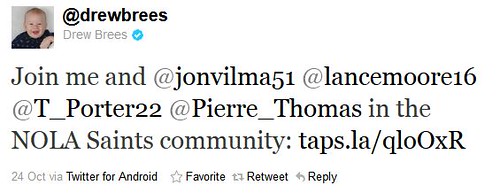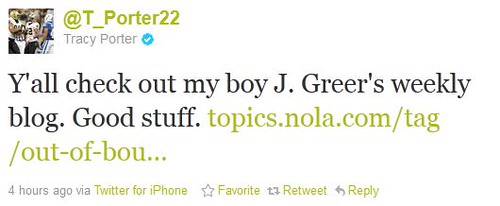Anyone who spends significant time on Twitter already suspects that random robots blurting incidentally related content at one another may not be too readily distinguished from what the human users regularly produce anyway. Well, except we're pretty sure most of the robots aren't being paid by news organizations to disguise paid advertising as regular content. That's what we have celebrities for.
Specifically, that's what we have these Saints players for.
The parent company of The Times-Picayune is paying five New Orleans Saints players to send out messages on Twitter encouraging their followers to visit the newspaper's Saints website. Under a contract with Advance Digital, players Drew Brees, Lance Moore, Tracy Porter, Pierre Thomas and Jonathan Vilma each tweeted praise for the newly redesigned Saints community on NOLA.com this month and included a link to the site, urging their Twitter subscribers to check it out.
Now it would be silly for anyone to ignore the fact that high profile athletes aren't in the business of monetizing their notoriety through endorsement deals of all kinds so it shouldn't surprise anyone that the players would sign on to whore themselves out like this. Commercialized whoring is basically the essence of their profession anyway. This is all just part of the package for them.
Advance, on the other hand, is... technically... a newsy-journalaministic conglomerate of sorts and thus has at least some responsibility to be somewhat ethicsish in their approach here. Ideally, we would say their responsibility is to refrain from engaging in deliberate deceptions where their paid advertising is presented as independently generated content. Obviously they disagree with that. Instead they prefer to fulfill their obligation by having their own reporter produce a newsish story about how perplexing the ethical dilemma is for the company.
"The intention here is to promote a new product, the Saints community on NOLA.com," said John Hassell, vice president of content for Advance Digital. "It's a new kind of space and a new kind of marketing for that space."
The idea of paying players to promote the news site raised a red flag for media ethics educators who say it can create the appearance of an inappropriate relationship between reporters and the subjects they cover.
"On its face, that is an obvious conflict of interest," said Al Tompkins, senior faculty for broadcasting and online at The Poynter Institute and the co-author of four editions of a "Newsroom Ethics" workbook. "The problem is you're creating a dual relationship with the very people you're covering." The Poynter Institute is a school for practicing journalists.
On the other hand, Garland Robinette thinks it's perfectly fine to have a "dual relationship with the very people you're covering" and he claims to be a hard thinking kind of guy so that's one contrary opinion. I also recall Clancy Dubos had a few authoritative words to lend to the subject a while back too.
Now here’s a fact that somehow has escaped the media’s attention, even though it is common knowledge: The following year, in October 2007, Robinette contracted a rare, life-threatening disease and was given less than two years to live. To make matters worse, his vocal chord was severed during a medical procedure, leaving him unable to speak. Now he was faced with the prospect of either dying within two years or surviving without being able to earn a living.
Robinette made a decision that people facing their own mortality often make: He turned to a passion he felt he had not fulfilled in his life, which was painting. It is undisputed that he is a gifted artist. He decided to open a studio and use his remaining time to paint, but he needed money to do that.
Here’s where the media narrative picks up again. He asked several wealthy acquaintances to lend his wife money, secured by a piece of property she owns on the Northshore. He was asking a personal favor, no doubt about it, but anyone who knows anything about borrowing money knows that no bank would ever lend $250,000 to a dying man, particularly one who would not be able to work even if he survived.
Fred Heebe, who has extensive real estate holdings, agreed to make the loan. This was in October 2007
You see, Fred Heebe offered Garland (through his company, not his personal finances) a $250,000 loan with which this dying man could build an art studio. One hopes that the construction proceeded at an accelerated rate. It would have been a shame to let Garland pass from this Earth without the building necessary to create one last painting of that Louisiana landscape Freeport-McMoran once hired him to help explain away their despoilment of.
Heebe may have filed the expense under "lobbying" but according to Clancy it was more of a charitable act. Sort of like the Make-a-Wish Foundation. And since Clancy is such an old hand at this, I trust that him to understand the nature of "dual" or conflicting relationships in a small community like New Orleans and therefore acknowledge his application of such experience in this case.
Additional wisdom is supplied by Advance's John Hassell.
Hassell, however, argued that because the posts include a reference to the fact that they are sponsored, or paid for, there should be no perception of conflict. Each tweet includes either the word "endorser" or the diminutive "spon," short for sponsored -- both preceded by the hashtag symbol -- to indicate that the messages are advertisements.Here Hasell is telling us that the appearance of the cryptic and extremely rare to Twitter hashtag #endorser as well as the not-quite-a-word tag #spon in the text of these manufactured enthusiasms tweeted by Saints players are what constitute "full transparency" according to Advance Publications.
"There's full transparency. There's no suggestion that the act of paid endorsement by a player reflects on the coverage of The Times-Picayune," Hassell said. "The Times-Picayune sports department coverage of the Saints is bar none the best and there was never an intention of suggesting these paid endorsements reflected on that coverage one way or the other."
Reassured?
Well maybe after you see it in action you'll feel better. Here's a screenshot I took of Drew Brees' Twitter feed last night where he promotes the #spon-sored NOLA.com content as well as directs you to the accounts of his fellow whores in case you would like to follow their whoring as well.

Uh oh neither tag appears! Now Drew is perhaps new to this, but he may need to be reminded of Advance's policy on "full transparency." Just for that, I say we withold his Beefymac until he learns to do it right.
Meanwhile here's Tracy Porter promoting more NOLA.com content. In this case he points to teammate Jabari Greer's blog, which is actually not that bad although nobody paid me to say so.

Whoops! Still not quite getting it. Oh well, keep trying guys! Although this is already the year we learned that online sports journalism may be able to write itself, it obviously hasn't quite yet perfected the art of selling itself. Not until we get those Twitter bots to behave properly, anyway.
*
No comments:
Post a Comment